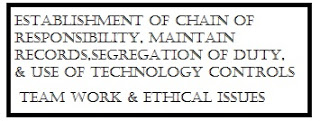Functional Internal Control for Small & Medium Scale Businesses – The degree of Business Operating Performance is a function of a functional internal control system in existence in the management of the business. The impact on the efficiency of organizational performance explains the roles of Functional Control System for an organization. Ask for Functional Internal Control for Small & Medium Scale Business
This internal control template for small and medium scale business will highlight the effect of internal control system on organizational efficiency and productivity which invariably affects its operational and financial performances. It will highlight the basic Principles, procedures, tools and elements of control and their applications in a small and medium scale business organizations.
Who Am I Talking to?
Table of Contents
In my years of professional practice I have come across a lot of organizations who operate anyhow. They don’t have a functional business plan to serve as management tool, nor internal control procedure/system. No operation policy, in short, no functional corporate governance structure/system in place. Consider Completfmc. handling your Functional Internal Control for Small & Medium Scale Businesses
May be you are saying internal control system is only for big companies; this article is for you. Read on and you will see that one of the challenges you have in your business is lack of this corporate governance issue of which internal control is a sub-set. I pray you read through and be able to apply these principles in your business, such that you will remember to send us a ‘thank you message’.
Small & Medium Scale Businesses Internal Control System
What is Corporate Governance?
Corporate governance is a system’s inclusive rules, practices and processes by which a company is directed and controlled. Corporate governance is a management system that involves balancing the interests of the many stakeholders or an organisation.
Such stakeholders include the management (the workforce), customers, suppliers, financiers, government and the community (the external environments).
Note from this that the workforce is just an element of corporate governance system. In this article you will notice that even though internal control focuses more on the workforce, that the operations of the internal control affects all these other stakeholders. What then is Internal Control System?
Internal Controls:
This is a set of systems and procedures designed by an organisation to ensure that all employees perform their duties ethically and honestly. Many look at internal control as accounting thing only, but that I not true.
It’s a framework or guideline on which the activities of the staff and operative systems – administrative , technical, production/manufacturing, service rendering or accounting – are based on.
Accounting controls deal specifically with the integrity ( of processes and procedure) of internal financial information and the accuracy of financial reports provided to outsiders.
Functional Internal Control for Small & Medium Scale Businesses
Your general internal control principles must include:
- Establish Responsibilities – responsibilities must be established within the organisation – organisations are always dived into departments and sections. This you must do.
- Maintain Records – proper records and adequate documentation must be maintained at every department and sections..
- Insure Assets by Bonding Key Employees – certsian key officers jobs are attached to certain organisation’s obligation.
- Segregate of Duties – no one person is allowed to originate a transaction and follow it to conclusion. But records and documentations as relating to transactions must form a link between department and sections. Must accounting source documents always originate from the operational and or via the administrative departments,
- Mandatory Employee Rotation – staff must change posts/job schedule periodically.
- Split Related Party Responsibility – no one is allowed to be involved in any transaction that concerns him or his relatives.
- Use Technological Controls – automation is a modern way of operations. Automate your operations, administration ( e.g. time keeping functions) and accounting system.
- Perform Regular Independent Reviews – designated officers can do this or contracted external auditors.
Small & Medium Scale Businesses Internal Control System
These are the general internal control principles, be it administrative, accounting, technical, engineering, technological etc. What happens is that these principles are adapted to suit every section of the organisation. For instance, internal control system in accounting must include regular accounts reconciliations, trial balances, and vouching or authorisation, while ICT departments must include access restrictions etc.
The objective is one, to safeguard the organisation’s assets which could be tangible and intangible asset.
In fact, organisation’s human resources are also assets that must not be allowed to be handled anyhow. Loss of a key staff may make an organisation close down.
Therefore, internal controls must be a system that engulfs all aspects of the organisation. It must be one that evolves and involves the highest organ of the management and flows down to the lowest organ of the organisation.
In fact, the management team must ensure that these checks and balances are functional at all times.
The next question centres on why you should do all of the above. Why are internal controls needed?
Small & Medium Scale Businesses Internal Control System
You have to do these things to:
- Safeguard the organisation assets,
- Reduce the risk of asset loss or misappropriation,
- Avoid expropriation of company asset by stakeholders,
- Ensure that assets records are complete and accurate,
- Ensure that the financial (reporting) statements produced are reliable
- Ensure that laws/ professional standards and regulations are observed.
Internal Control System
The major thrust of this article is that internal control promotes efficiency and productivity.
Now, listen to this. If the financial statement you produce is not reliable due to flaws in your internal control, you will have a lot of problems. This is because:
- The organisations net-worth will not be accurate – because your financial report is ‘window dressed’
- No investor will be interested in such organisation
- The organisation will not qualify as a patriotic corporate citizen
- If records violate relevant corporate laws of the country, it could be prosecuted
- The tax authorities will certainly not let you go free just like that.
In addition, administrative incompetencies creep in;
- Administratively, rules and orders will not be obeyed,
- Customers, including suppliers will not be well treated,
- Cost of production will be very high
- Flow of instructions/documents will be flawed,
- Environmental problems could arise – militancy
- Efficiency and productivity declines,
- Bottom line dwindles.
- There are many other repercussions.
Functional Internal Control for Small & Medium Scale Businesses
Do you want to ask me again, why your internal control system must be functional?
As you can see, you must ensure that adequate measures are always taken to prevent, detect, and correct errors or frauds. I hope you know that deliberate errors are fraud and are different from natural/unintentional errors. The following measures are necessary:
- Detective: These are measures designed to detect errors or irregularities that may have occurred.
- Corrective: These are corrective models designed to correct errors or irregularities that have been detected.
- Preventive: These are designed to keep errors or irregularities from occurring in the first place.
This internal control template for small and medium scale business has shown the effect of internal control system on organisational efficiency and productivity which are positively correlated. A functional internal controls system promotes good ethical conduct, proper documentations and analysis, accurate financial reporting, healthy business environment etc. These are the factors that enhances Business Operation Performance. When productivity is enhances the organisations bottom line will be affected.
Internal Control System
If you have further challenges a business coach & consultant could be of help. Ensure you keep in touch with this website regularly for your business tips, career, and recruitment information. Follow us on our social media to like us. My previous write-up on OPEX and CAPEX may interest you.
For a Functional Internal Control for Small & Medium Scale Businesses, do you desire articles on Business Tips, Business plan and feasibility study, C.A.C. Incorporation, Accounting and Auditing, Tax Management, Mining, travels and tours, feasibility analysis, real estate management, then visit here. Contact [email protected] and +234 8034347851 Check out this

Deacon Anekperechi Nworgu, a seasoned economist who transitioned into a chartered accountant, auditor, tax practitioner, and business consultant, brings with him a wealth of industry expertise spanning over 37 years.




